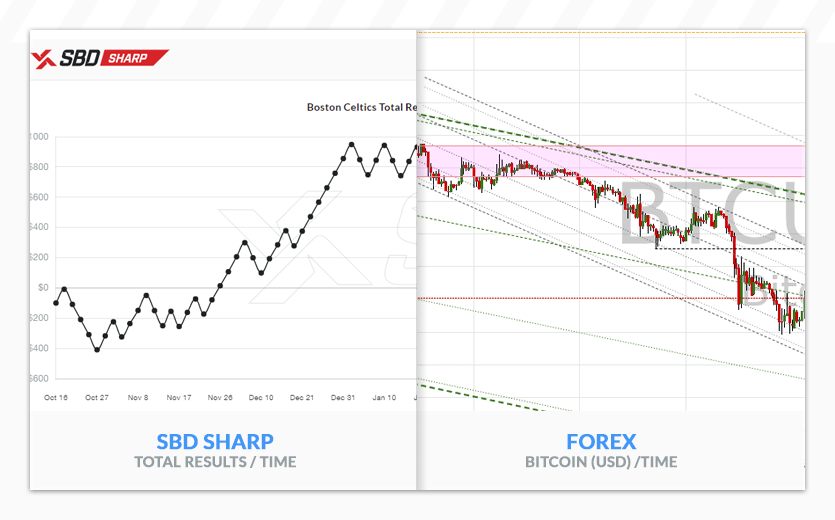Sports Investing: Pick Teams as Long-Term Investments

Sports investing has become an increasingly popular idea as the stigma surrounding sports betting fades. No doubt, wagering on sports outcomes can be a viable investment strategy for those with the skills and knowledge to take advantage of it.
Sports investing can take many different forms. Futures markets like the Global Sports Financial Exchange allow you to trade teams in an open marketplace, buying and selling stakes rather than wagering on the outcome of individual events. Of course, trading teams isn’t the same experience as betting on game outcomes.
If you want to get started with sports investing while continuing to wager on outcomes, this is the guide for you. This article outlines how you can identify teams with long-term value and consistently bet on them to grow your bankroll over time.
In addition to a detailed explanation of value and how it affects your betting strategy, we’ll show you how to use our NFL ATs records, which doubles as a sports investing tool that tracks value as return on investment.
Value in Sports Betting
Sports betting and investing share a common goal: making money. Clearly, you see returns when you pick teams that win. With that in mind, sports investing should be as simple as finding the teams that win the most and consistently betting on them, right?
Not so fast…
It is hugely important for new sports investors to recognize that simply picking teams that win consistently does not lead to long-term profitability.
In reality, you are far more likely to lose money if you’re only betting favorites. Spoiler alert: the best teams in the league are almost always going to be favorites. Their value as long-term investments suffers because of it.
So, if you can’t make money betting on the best teams, where should you invest those hard-earned dollars?
In investments, value is found wherever market inefficiencies occur. Inefficiencies occur when the market suggests something is worth more or less than its actual, real-world value. Remember that markets are models of the world we live in. They are not perfect reflections of reality.
In terms of sports betting, a team’s current market value is reflected in the odds assigned to it by the sportsbook. These odds are an expression of public opinion and expert calculations regarding the team’s abilities, presented in terms of their likelihood to succeed in a particular event.
Inefficiencies occur when oddsmakers, influenced by public opinion, incorrectly calculate the likelihood an event will occur. Teams that offer the most positive value as investments are the ones that consistently prove the oddsmakers and the public wrong – defying the odds to win more often than the market says they should.
Short-Term Betting Value: Implied Probability vs Actual Probability
Determining whether an individual wager presents value is relatively simple. To do so, you need to compare the implied probability expressed by the odds with your assessment of the actual probability an event will occur. Let’s take a quick look at some simple calculations you can do to find implied probability.
Risk/Return = Implied Probability
Say you want to find the implied probability of an outcome listed at -110 odds. This means you would have to risk $110 to profit $100, for a total potential return of $210.
110/210 = 52.8
-110 odds imply a 52.8% probability that this outcome will occur. If you believe that the chances are more like 70%, you would jump on this wager as offering incredible value.
Of course, this article is focused on long-term betting strategy. We’re looking for the teams that continually outperform their implied probabilities. Let’s explore the best metrics to compare value over the long run.
Long-Term Betting Value: Team Win-Loss Records vs Return on Investment
Win-loss records are arguably the most important indicator we can use to predict a team’s future success on the field. But they don’t tell us anything about how perceptions of the team changed over time, how these perceptions affected the odds, and how those odds affected the payouts bettors receive when they win.
Return on investment tells you exactly how much money you can expect to make relative to the amount you risk. Teams that always win have lower ROI because the odds always favor them and offer measly payouts for victories.

Teams with a high historical return on investment (ROI) have continually defied the odds and shown themselves to have more value than the public and the sportsbooks give them credit for. If they continue to do so (and the public fails to pick up on their success), these teams are the best candidates to bet consistently as sports investments.
So, if historical ROI is the crystal ball that allows you to determine a team’s long-term betting value, how do you find it?
How to Find the Most Profitable Teams
Luckily, finding teams with the highest historical ROI doesn’t require any math or calculations whatsoever. Using our team trends pages, you can see exactly how every team across major leagues has performed on the season to-date.
SBD Sharp tracks teams as investments over time, providing quick glimpses and graphic representations of their value. The graphs are sure to remind you of the line graphs used to track stock prices, and they function the same way.

Using this tool, you can see which teams were the most profitable to bet on throughout the season, or in scenarios such as at home, when away, when favored, or as underdog. With these metrics, you can select teams to consistently bet on every game, or when conditions match those from strong past performances. SBD Sharp tracks the NFL, NBA, NHL, MLB, college basketball, and college football, providing historical ROI for every team when betting on the moneyline, point spread, or totals (over/under).
Sports Investing Strategy: Use ROI to Pick Teams Like Stocks
Once you watch the tutorial and spend a bit of time familiarizing yourself with SBD Sharp, you’ll quickly see how consistently betting on one team all year can bring home some serious profit.
In this sense, you can pick teams “like stocks” without a prediction market like the Global Sports Financial Exchange. The exchange is highly responsive to the market forces of supply and demand, and virtually everyone who participates is highly engaged and experienced in handicapping sports.
The same cannot be said of traditional sports betting, so you’ll likely see bigger returns betting a consistent unit on a high-value team than you will holding their shares in the exchange.
So, there you have it: a betting strategy that allows you to pick single teams as long-term investments with readily available and easily digestible data.
Of course, even the sharpest handicappers need to practice effective bankroll management and responsible behavior. Success in investments of any kind is about managing risk, not blindly embracing it.
Set aside an amount you’re comfortable losing and divide it into a unit size that’s small enough to use for every game. From there, pick a team with solid historical ROI, place your wagers, and sit back to watch the money piles grow (hopefully).

Content Marketing Specialist
A sports fanatic and strategic wordsmith, Mitchell has been writing gaming content for over seven years. As sports betting emerges in markets across the globe, he’s ready to journey alongside those who haven’t wagered before with informative articles and comprehensive how-to guides.



